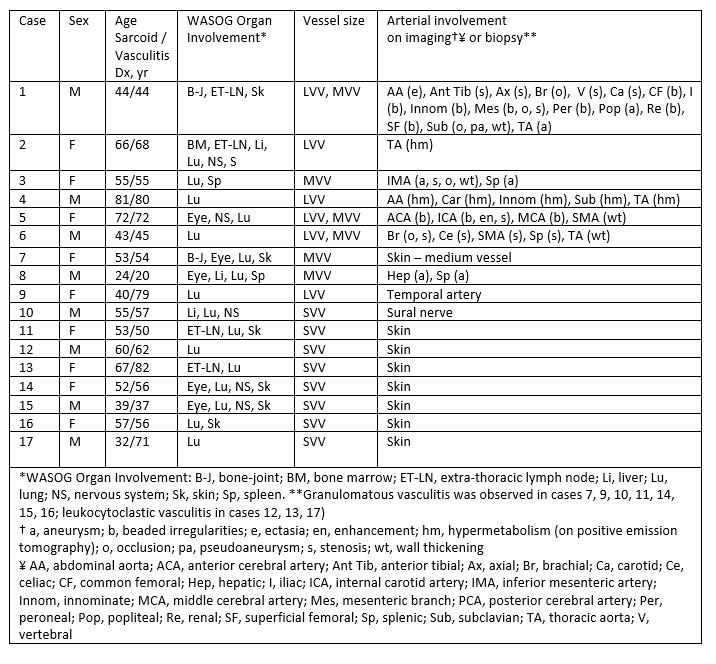Session Information
Date: Tuesday, November 9, 2021
Title: Vasculitis – Non-ANCA-Associated & Related Disorders Poster II (1862–1888)
Session Type: Poster Session D
Session Time: 8:30AM-10:30AM
Background/Purpose: Vasculitis in patients with sarcoidosis is rare and can affect blood vessels of any size. Limited information describing this association is available. The purpose of this study is to describe a large, single-institution case-series of patients with sarcoidosis and vasculitis.
Methods: A single-institution retrospective study was performed reviewing all patients with a diagnosis code for sarcoidosis and vasculitis between January 1, 1998 and December 31, 2019. Medical records were individually reviewed, and data regarding diagnosis, treatment, and outcomes were abstracted. Sarcoidosis was diagnosed based on histologic, radiographic, and clinical data with exclusion of alternative diagnoses. Diagnosis for small vessel vasculitis (SVV) required biopsy confirmation. Patients with large or medium-vessel vasculitis (L/MVV) required biopsy and/or arterial imaging. Comparison between patients presenting with L/MVV versus patients with only SVV was performed.
Results: Seventeen patients were identified during the study period. Nine patients (56% female) had L/MVV and 8 (50% female) had SVV. Mean±SD age at sarcoidosis diagnosis was 53.2±17.8 and 51.9±11.4 years and mean±SD age at vasculitis diagnosis was 57.4±19.6 and 59.0±13.4 years in L/MVV and SVV groups, respectively. Number of organ systems involved by sarcoidosis was similar [median (IQR) 3 (1,4) L/MVV vs. 2.5 (1.75, 3.25) SVV]. Sarcoid organ involvement and vasculitis vessel distributions are noted in Table 1. Mean length of follow-up was 11.5±12.8 years in L/MVV and 13.1±14.3 years in SVV. All patients were treated with glucocorticoids for vasculitis. More patients with L/MVV were treated with at least one DMARD/biologic (8/9, 89%) compared to SVV (3/8, 38%, p=0.05). Complete response to therapy for vasculitis was observed in 8/9 L/MVV and 7/8 in SVV. Four patients in SVV group were able to stop all immunosuppression but only one patient with L/MVV was off all therapy at last follow-up.
Conclusion: Vasculitis in patients with sarcoidosis is uncommon. Variability exists in the vessels involved and the treatments utilized. Overall this series observed favorable outcomes with a high percentage achieving complete response, regardless of vessel size affected.
 Table 1: Characteristics of vasculitis in patients with sarcoidosis
Table 1: Characteristics of vasculitis in patients with sarcoidosis
To cite this abstract in AMA style:
Kimbrough B, Warrington K, Langenfeld H, Crowson C, Carmona E, Virata A, Koster M. Vasculitis in Patients with Sarcoidosis: A Single-Institution Case Series of 17 Patients [abstract]. Arthritis Rheumatol. 2021; 73 (suppl 9). https://acrabstracts.org/abstract/vasculitis-in-patients-with-sarcoidosis-a-single-institution-case-series-of-17-patients/. Accessed .« Back to ACR Convergence 2021
ACR Meeting Abstracts - https://acrabstracts.org/abstract/vasculitis-in-patients-with-sarcoidosis-a-single-institution-case-series-of-17-patients/
